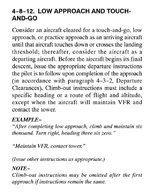Sharkbait35
Lurker
- Messages
- 4
This question is in reference to aircraft conducting practice approaches and then departing for vfr work (overhead, vfr departure, etc.).
One facility I was at would tell aircraft, "at the completion of your approach, maintain vfr..." while the facility I'm currently at tells aircraft "report your IFR cancelation with the tower".
We can run into issues where the aircraft forgets to report IFR cancelation and then we're wasting time getting him to report it. We have aircraft that commonly like to shoot the ILS to a touch and go and then depart to the initial for the overhead. Is the approach controller allowed to give the instruction that IFR is canceled at the completion of the approach? If so, where can I find the rule regarding this?
One facility I was at would tell aircraft, "at the completion of your approach, maintain vfr..." while the facility I'm currently at tells aircraft "report your IFR cancelation with the tower".
We can run into issues where the aircraft forgets to report IFR cancelation and then we're wasting time getting him to report it. We have aircraft that commonly like to shoot the ILS to a touch and go and then depart to the initial for the overhead. Is the approach controller allowed to give the instruction that IFR is canceled at the completion of the approach? If so, where can I find the rule regarding this?

